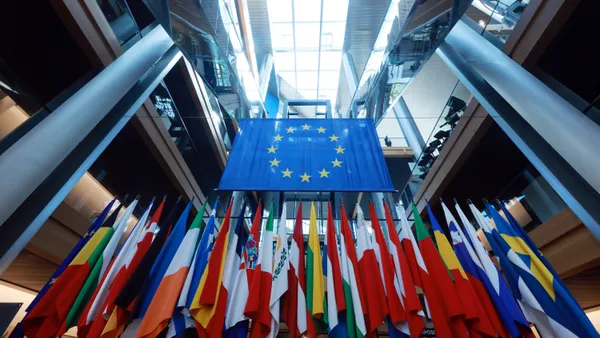Dive Brief:
- ESG ratings providers operating in the European Union must become authorized by the bloc’s securities and markets regulator under an agreement reached Wednesday. The council also created a temporary optional registration option for smaller ESG ratings companies and any new market entrants.
- The rule is expected to provide increased quality, transparency and clarity of ESG ratings, giving investors the information needed to align their decisions with their sustainability objectives.
- The regulation is part of the EU’s ongoing updates to its sustainable finance regulations and broader ESG and climate disclosure requirements.
Dive Insight:
Non-EU ratings companies that wish to be recognized fully will need to comply with the entirety of the regulation and also apply to be recognized by the European Securities and Markets Authority, just like EU providers. Non-EU based providers with under 12 million euros ($13.19 million) in revenue for three consecutive years may operate in the EU, but also must seek ESMA recognition.
The EU Parliament said it proposed the legislation because environmental, social and governance are becoming more mainstream and are increasingly important to investor confidence in sustainable products.
“ESG ratings play an enabling role for the proper functioning of the EU sustainable finance market by providing critical sources of information for investment strategies, risk management and disclosure obligations by investors and financial institutions,” the proposed regulation says.
Smaller EU ratings providers, who also have less than 12 million euros in revenue for three consecutive years, and new market entrants will have to comply with some of ESMA’s organizational and governance principles, as well as transparency requirements, but will not have to pay the supervisory fees to the agency. After three years in the lighter regime of regulation, smaller providers will be required to comply with the full rule.
The proposal also looked to more clearly demarcate where ESG ratings providers stop their work as objective observers and begin other business activities. Initially, it was proposed that providers would need to create separate legal entities for their other business operations, but the council agreed to drop that requirement as long as companies put measures in place to avoid conflicts of interest and clearly state what activities are done as ESG ratings providers versus other activities.
Last week, the council reached an agreement to temporarily exempt financial institutions from needing to identify and mitigate environmental and social harms in their supply chain.












